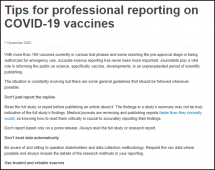Tips for Professional Reporting on COVID-19 Vaccines
Journalists play a vital role in informing the public on science, specifically vaccine, developments, in an unprecedented period of scientific publishing.
The situation is constantly evolving but there are some general guidelines that should be followed whenever possible:
- Don’t just report the topline
- Don’t trust data automatically
- Use trusted and reliable sources
- State the source
- Define the terms
- Use clear language
- Explain the stage
- Report the numbers
- Disclose the side effects
- Use appropriate imagery
- Don’t forget demographics
- Remind everyone of the benefits of vaccines
Tackle vaccine hesitancy by reporting facts and figures on vaccine efficacy in ending epidemics throughout history.
Source: World Health Organization
Date of Publication: December 18, 2020
SIMILIAR RESOURCES
Tools
Examples
- Vaccine Hesitancy and COVID-19: Considerations for Communication
- Framework for Decision-making: Implementation of Mass Vaccination Campaigns in the Context of COVID-19
- An Uncertain Public — Encouraging Acceptance of Covid-19 Vaccines
- Interpersonal Communication for Immunization (IPC-I)
- Behavioural Considerations for Acceptance and Uptake of COVID-19 Vaccines: WHO Technical Advisory Group on Behavioural Insights and Sciences for Health
- Misunderstanding Vaccine Side Effects Poses a Problem for Uptake
- Vaccine Hesitancy in Low- and Middle-income Countries: Potential Implications for the COVID-19 Response
- Social Media and Vaccine Hesitancy
- COVID-19 Planning Guide for Adapting Risk Communication and Community Engagement as Public Health and Social Measures Shift: With Safety Tips for Conducting Community Meetings
- 5 Ways to Use Sensitivity When Writing About Vaccines

